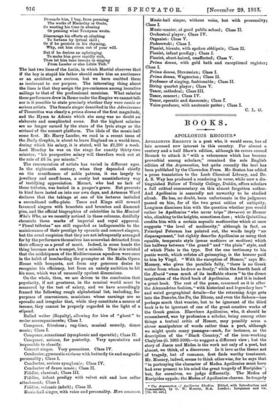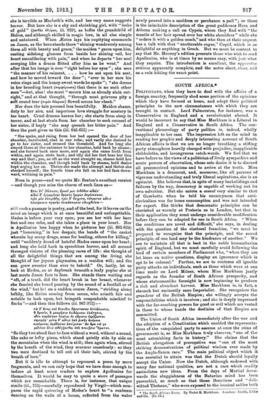BOOKS.
APOLLONIUS RHODIUS.*
APOLLONIUS RHODIUS is a poet who, it would seem, has of late aroused new interest in this country. For almost a century and a half Shaw's edition, although its errors roused Brunk to attack it " with a vehemence which has become proverbial among scholars," remained the sole English edition of the Argonautica, but quite recently the text has been published by the Clarendon Press. Mr. Seaton has added a prose translation to the Loeb Classical Library, and Dr. A. S. Way has produced a rendering in verse, while now a dis- tinguished Fellow of Trinity College, Dublin, offers scholars a full critical commentary on this almost forgotten author. And Apollonius is assuredly not unworthy to be studied afresh. He has, no doubt, been unfortunate in the judgment passed on him, for of the two great critics of antiquity, Longinus dismisses him with the question whether you would rather be Apollonius " who never trips " (&wTorras) or Homer who, climbing to the heights, sometimes does ; while Quintiliali credits him with a certain aequalis mediocritas which at once suggests "the level of mediocrity," although in fact, as Principal Peterson has pointed out, the words imply " no disparagement," but rightly describe Apollonius as using that equable, temperate style (genus mediocre or medium) which lies halfway between " the grand" and " the plain" style, and of which Plato is the type. But the one testimony to his poetic worth, which refutes all gainsaying, is the honour paid to him by Virgil. " With the exception of Homer," says Mr. Mooney, who gives the parallels fully, " there is no Greek writer from whom he drew so freely," while the fourth book of the YEneid "owes much of its ineffable charm" to the direct inspiration of the third book of Apollonius. And it is indeed a great book. The rest of the poem, crammed as it is after the Alexandrine fashion, " with historical and legendary lore " and weird geographical details—for the returning Argo gets into the Danube, the Po, the Rhone, and even the Sahara—has perhaps much that wearies, but to be ignorant of the third book is to be ignorant of one of the great creative works of the Greek genius. Elsewhere Apollonius, who, it should be remembered, was by profession a scholar, being among other things a textual critic of Homer, may possibly seem a clever manipulator of words rather than a poet, although we might quote many passages—such, for instance, as the description of the " Black Country," of the iron-working Chalybes (ii. 1002-1008)—to suggest a different view ; but the story of Jason and Medea is the work not only of a poet, but almost, we think, of a discoverer. In it love as the theme not of tragedy, but of romance, first finds worthy treatment. Mr. Mooney, indeed, seems to think otherwise, for he says that " in portraying the character of Medea Apollonius must have had ever present to his mind the great tragedy of Euripides"; but, for ourselves, we judge differently. The Medea of Euripides appals; the Medea of Apollonius charms. In tragedy • The Argonautica rf Apollonius Ehodius. Edited, with Introduction and Commentary, by G. W. Mooney, M.A. London : Longnsana and Co, [12r. 6d. net-] she is terrible as Macbeth's wife, and her very name suggests horror. But here she is a shy and shrinking girl, with " locks of gold" (tayeits 4Nipas, iii. 829), as befits the grandchild of Helios, and although skilled in magic lore, in all else simple and untutored. When ..etes lays his unpitying commands on Jason, as the hero stands there " shining wondrously among
them all with beauty and grace," the maiden " gazes upon him, casting sidelong glances from beside her shining veil, her heart smouldering with pain," and when he departs " her soul creeping like a dream flitted after him as he went." And after that his image is ever "right before her eyes"; she sees "the manner of his raiment, . . . how he sat upon his seat, and how he moved toward the door "; "ever in her ears his voice rings and the honey-sweet words he spake"; "she deems in her brooding heart (aopqa5possa) that there is no such other man "—but, alas ! she must " mourn him as already slain out-
right," and at that thought, " through most grievous pity a soft round tear (Tepee ScLicpvoy) flowed across her cheek."
Nor does the tale proceed less beautifully. Maiden shame, duty to her sire, and imperious love struggle for mastery in her heart. Cruel dreams harass her; she starts from sleep in terror, and at last steals from her chamber to seek counsel of her sister, if haply "she may quench her bitter pain." And then the poet gives us this (iii. 645-655) :—
" She spake, and rising from her bed opened the door of her chamber, barefooted, clad in one robe; and verily she desired to go to her sister, and crossed the threshold. And for long she stayed there at the entrance to her chamber, held back by shame ; and she turned back once more, and again she came forth from within, and again stole back ; and idly did her feet bear her this way and that ; yea, as oft as she went straight on, shame held her within the chamber, and though held back by shame, bold desire kept urging her on. Thrice she made the attempt and thrice she checked herself ; the fourth time she fell on her bed face down- ward, writhing in pain."
Even in prose—and we quote Mr. Seaton's excellent version —and though you miss the charm of such lines as- frOl ST' go, es46801 caUs" aiSoi ?fryottirnv Opaabs 7p.epos irtp6PECI-KEV. Tpls ,tem Tpls 5' i'crxevo, v‘vpavoy arra
AihrpoLo 4p•iiccIa1recrev
still such a passage is poetry, and of the best, for it leaves on the mind an image which is at once beautiful and unforgettable. Medea is before your very eyes; you see her with her bare feet and one robe, and she takes a place in your heart. Nor is Apollonius less happy when he pictures her (iii. 801-824) just "loosening," in her despair, the bands of "the casket wherein lay many drugs, some for healing, others for killing," until "suddenly dread of hateful Hades came upon her heart ; and long she held back in speechless horror, and all around thronged visions of the pleasing cares of life: she thought of all the delightful things that are among the living, she thought of her joyous playmates, as a maiden will; and the sun grew sweeter than ever to behold." Or, lastly, let us look at Medea, as at daybreak beneath a leafy poplar she at last meets Jason face to face. She stands there waiting and "oft, of a truth, did the heart break in her breast, whenever she fancied she heard passing by the sound of a footfall or of the wind," but lo ! on a sudden comes Jason, " striding along loftily, like Sirius coming from ocean, who ariseth fair and notable to look upon, but bringeth unspeakable mischief to flocks "—and then this follows (iii. 967-972) :— Ta) avEv )(al 6vasSot gOarracay aAAIPLoariv, 4) Silverly, 1) magpijo-ty ?ec&ftievot iAckperty, ar.re vapao-crov gicnlun fY o6pecrsY 4pplCcopTaL psipEktip • kaTa 5' a6rts irrD Priv areitoto KivE;ALEvat Elicihcrav airefptrov • /Zs &pa •rai 7€ FAAov teXes 006iaoCiat i,rL xvotflow'EpteTos.
"So they I so stood face to face without a word, without a sound, like oaks or lofty pines, which stand quietly side by side on the mountains when the wind is still; then again when, stirred by the breath of the wind, they murmur ceaselessly : so they
two were destined to tell out all their tale, stirred by the breath of love."
Bat it is idle to attempt to represent a poem by mere fragments, and we can only hope that we have done enough to induce at least some readers to explore Apollonius for themselves. It would be easy to quote a score of passages which are remarkable. There is, for instance, that unique
simile (iii., 755)—carefully reproduced by Virgil—which corn-
pares the rapid quivering of Medea's heart to "a sunbeam
dancing on the walls of a house, reflected from the water and co. [;s. ca.] newly poured into a cauldron or perchance a pail " ; or there is the inimitable description of the great goddesses Hera and Athena making a call on Cypris, whom they find with " the mantle of her hair spread over her white shoulders" while she " orders it with a golden comb," and who then at their request has a talk with that " unutterable rogue," Cupid, which is as delightful as anything in Greek. But we must be content to say that Mr. Mooney's edition presents those who wish to read Apollonius, who is at times by no means easy, with just what they require. The introduction is excellent, the app«rutus critic us apparently complete, and the notes short, clear, and as a rule hitting the exact point.



















































 Previous page
Previous page